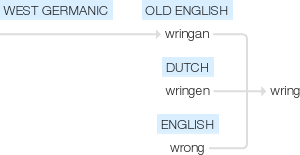Wring
Old English wringan (verb), of West Germanic origin; related to Dutch wringen, also to wrong.
wiktionary
From Middle English wryngen, wringen, from Old English wringan, from Proto-Germanic *wringaną (compare West Frisian wringe, Low German wringen, Dutch wringen, German ringen ‘to wrestle’), from Proto-Indo-European *wrenǵʰ- (compare Lithuanian reñgtis(“to bend down”), Ancient Greek ῥίμφα(rhímpha, “fast”)), nasalized variant of *werǵʰ- ‘bind, squeeze’. More at worry.
From Middle English wrynge(“press”), from Old English wringe.
etymonline
wring (v.)
Old English wringan "press, strain, wring, twist" (class III strong verb; past tense wrang, past participle wrungen), from Proto-Germanic *wreng- (source also of Old English wringen "to wring, press out," Old Frisian wringa, Middle Dutch wringhen, Dutch wringen "to wring," Old High German ringan "to move to and fro, to twist," German ringen "to wrestle"), from *wrengh-, nasalized variant of *wergh- "to turn," from PIE root *wer- (2) "to turn, bend." To wring (one's) hands "press the hands or fingers tightly together (as though wringing)" as an indication of distress or pain is attested from c. 1200.
